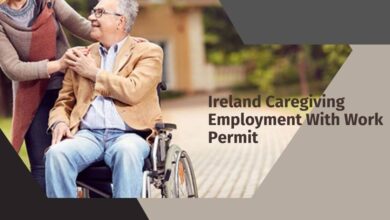Care Support Roles In The USA With Sponsored Visa 2025 – Apply Now

Care support roles in the USA with sponsored visa opportunities in 2025 offer international candidates a chance to work in a compassionate and essential field. These roles typically involve assisting individuals with daily activities, providing emotional support, and helping maintain a safe and comfortable living environment. With growing demand in healthcare and senior care sectors, sponsored visa programs enable qualified caregivers to contribute meaningfully while gaining valuable work experience and potential pathways to permanent residency.
Requirements:
- This section outlines the essential qualifications, legal conditions, and personal attributes needed to work as a caregiver in the United Kingdom. It includes education, sponsorship, and employment-related prerequisites.
- Candidates must hold certification from an accredited program under the National Association for Home Care and Hospice (NAHC).
- Applicants should be capable of assisting individuals who need elderly care, pediatric support, or recovery assistance following illness or injury.
- A sound understanding of medical practices is essential to review care plans and ensure proper implementation.
- Strong communication skills are necessary to interact clearly with patients and collaborate effectively with healthcare teams.
- Empathy and the ability to form supportive relationships with patients are highly valued in this role.
- Applicants must be qualified professionals, such as adult social care workers, licensed doctors, or health and wellness providers.
- An academic background or training in health or social care is required.
- The employing organization must be based in the United Kingdom and hold approval from the UK Home Office.
- A certificate of sponsorship is required from the employer, detailing the nature of the job offered.
- The salary provided should meet the minimum threshold based on the role.
- Applicants must secure a valid job offer before applying for a visa.
Responsibilities:
- This section explains the primary tasks caregivers are expected to perform. These responsibilities revolve around personal care, health monitoring, companionship, and support for everyday living.
- Provide assistance with hygiene-related tasks such as grooming, bathing, and maintaining cleanliness
- Prepare and serve healthy meals while accommodating dietary restrictions and preferences
- Design and facilitate appropriate activities to keep clients mentally and emotionally engaged
- Make meals and beverages as needed for clients
- Help maintain a tidy, welcoming, and hygienic environment for those receiving care
- Take care of light cleaning duties around the client’s living space
- Support clients in mobility, including lifting, repositioning, and transportation
- Offer companionship to reduce isolation and improve emotional well-being
- Ensure clients follow their prescribed medication schedule
- Assist clients with their physical therapy routines as needed
- Accompany clients to scheduled appointments
- Track and record vital signs like temperature, pulse, and weight
- Adhere to care instructions provided by healthcare professionals
- Complete errands or accompany clients on personal tasks
- Notify medical staff of any changes in a client’s condition or behavior
Benefits:
This section highlights the advantages of working as a caregiver in the United States with employer-sponsored visa support, both from a personal and professional standpoint.
- Legal Work Authorization: Caregivers with an H1B visa are legally permitted to work in the U.S., offering access to better employment options.
- Job Security: Employer sponsorship often represents a long-term commitment, providing greater work stability.
- Professional Growth: These roles may offer opportunities for continued learning and skill development in caregiving.
- Cultural Exposure: Caregivers experience a new cultural environment, leading to valuable personal and cross-cultural insights.
- Financial Stability: Regular income enables caregivers to support themselves and potentially assist their families abroad.
- Networking Opportunities: Caregivers can build professional and personal connections that may benefit their future careers.
- Social Impact: Caregivers contribute positively to society by supporting individuals who need assistance, making a real difference.
- Pathway to Residency: Though not automatic, H1B visa holders may eventually qualify to apply for permanent residency in the U.S.
- Transferable Skills: Skills such as empathy, communication, and problem-solving are developed and can be applied to various professions.
- Emotional Fulfillment: Helping others brings a sense of purpose and emotional satisfaction by improving lives directly.
Salary:
This section presents typical earnings for caregivers in the U.S., offering insight into what individuals can expect based on experience levels.
The average annual income for healthcare assistants in the U.S. is around $37,656, which equals approximately $18.10 per hour. Entry-level roles start at about $31,713 annually, while more experienced professionals may earn up to $64,870 per year.
Check Also: Daycare Jobs in USA – Visa Sponsorship
How to Apply?
- This section explains how international applicants can pursue caregiving roles in the United States, along with details about visa procedures and hiring processes.
- The simplest route is to find employment through a company in your home country that has U.S. offices and allows for international transfers.
- Due to tight immigration policies, job seekers typically need to secure an offer before entering the U.S.
- If qualified, some employers may provide visa sponsorship, though it can be competitive.
- Application processes in the U.S. resemble those in the U.K., involving the submission of a résumé and a cover letter.
- Some job listings may require you to fill out a formal application form instead.
- If shortlisted, candidates are invited to interviews, which may include tests to assess cognitive and professional abilities.
- Multiple interview rounds may be conducted depending on the role and the employer
Frequently Asked Questions:
What are Care Support roles in the USA?
Care support roles (also called caregivers, personal care aides, or home health aides) involve:
Assisting elderly, disabled, or chronically ill individuals
Helping with daily activities (bathing, dressing, meals)
Light housekeeping
Administering medication (in some cases)
Providing companionship and emotional supportWhat qualifications are needed?
Requirements vary by employer and visa type, but generally:
Age: 18 years or older
Basic to intermediate English skills
Experience in caregiving, nursing, or personal care (1–2 years preferred)
Some employers may require:
CPR/First Aid Certification
High school diploma
Training as CNA (Certified Nursing Assistant) (preferred but not always required)What kind of employers sponsor caregivers in the USA?
Visa sponsorship is usually offered by:
Home care agencies
Nursing homes
Assisted living facilities
Private families (occasionally, through immigration lawyers)
Hospitals and long-term care institutions



